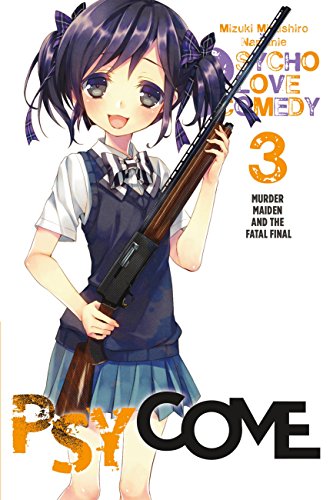By Mizuki Mizushiro and Namanie. Released in Japan by Enterbrain. Released in North America by Yen On. Translated by Nicole Wilder.
The good news is that this is a much more tonally consistent book than the first two, and has a better idea – most of the time – as to when to be over the top funny and when to have the reader genuinely disturbed. Renko remains the best character, getting in so many hilarious lines I can’t even bother to count them but also getting a really surprising amount of character depth (though I could have done without the epilogue telling rather than showing us all that character depth). Eiri continues to be the girl that Kyousuke SHOULD end up with, and I am very happy to hear that she’s the focus of the next book. Maina was less annoying as well this time around, and though Shamaya is back she seems to have lost the unpleasant implications of the end of the last book and just become another garden variety psycho. What I’m trying to say here is that I enjoyed everything about this except for the two lead characters and the main plot.
I knew going in that I wasn’t going to warm up to Ayaka. The “little sister obsessed with her big brother to an unnerving degree” is something already greatly exaggerated and overused by anime in general, and so turning the dial to 11 is not as successful as I think the author wants it to be. We’re meant to be amused at first and then gradually horrified as we realize that Ayaka is far more mentally unbalanced than she really should be for a “comedy” light novel, but since she enters the book hitting the high note and then only gets higher after that, we’re merely exhausted. That said, the larger issue here is Kyousuke.
There are hints, particularly at the end of the book, that Kyousuke’s entire family is, shall we say, a bit unusual, but even so, his reactions to Ayaka’s behavior beggar belief. I could be wrong here by dint of being an only child, but I’m fairly certain even the most doting brother would have noticed what was going on with Ayaka long before he did. It’s one of those cases where the revelation can’t come until the climax of the book, and so the hero ends up being unnecessarily stupid. The plot – when it arrived – was actually quite interesting, involving Ayaka deliberately being recruited into the school by their teacher, who can see a future assassin in her no doubt, but the fact that we didn’t find out about that until 90% of the way through the book is frustrating. And the subplot – involving everyone studying for finals, which have awful punishments for the bad students and setups for the next volume for the good students – was simply dropped at the end, making the “Fatal Final” a giant anticlimax.
And so, having spent much of this review being annoyed, let’s return to my original paragraph. This is a better book than the first two. The writing is more consistent, and there were some nice heartfelt scenes almost despite itself. But I don’t think Psycome will ever stop teetering on the edge of being a flaming ball of disaster, as seen in the Kamiya Family this time around. As long as it teeters and doesn’t fall off, I’ll keep reading.

